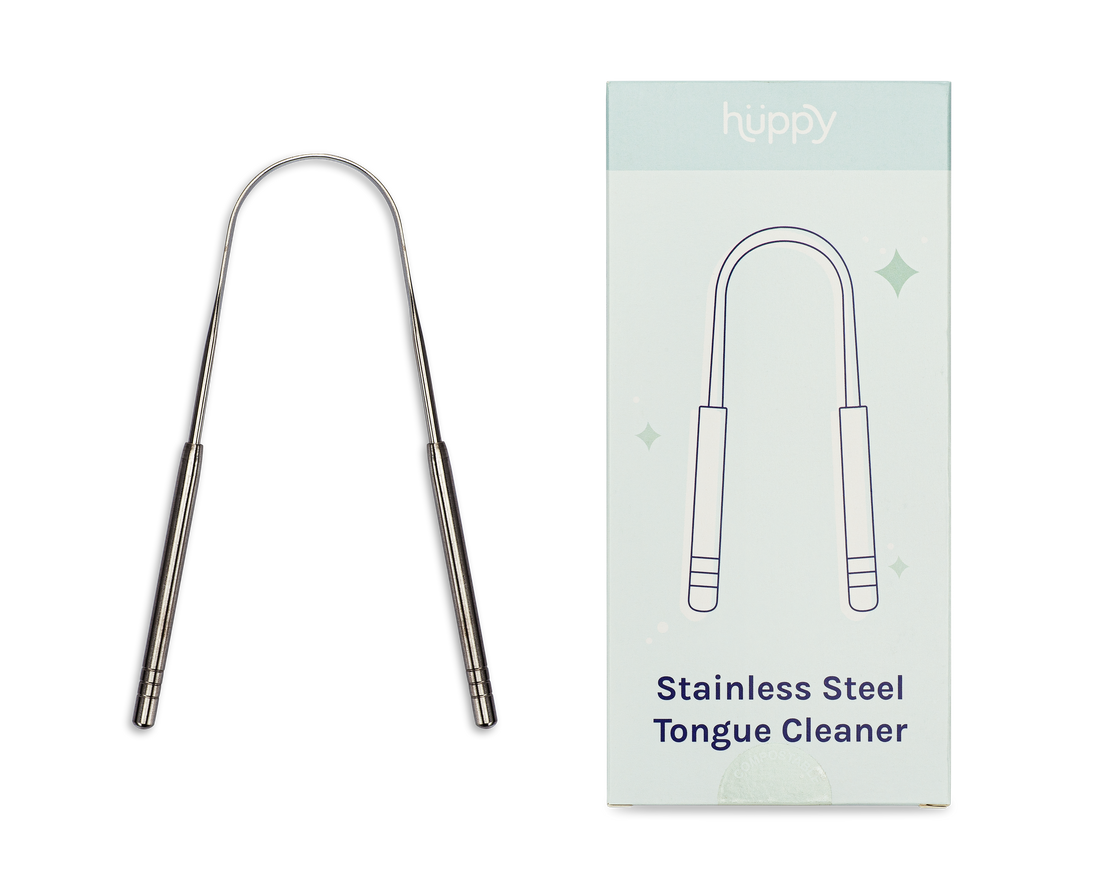
How A Tongue Scraper Can Boost Your Oral Health
A tongue scraper is a small tool made from plastic or metal, that remove dead cells, food particles, and debris from the surface of your tongue. Using a tongue scraper can help you achieve fresher breath and lower your risk of developing gum disease and dental decay by giving you a cleaner mouth.
This article explains how tongue scrapers can improve your oral hygiene and reduce odor-causing bacteria, as well as how to use them for maximum impact.
Can You Use Your Toothbrush To Clean Your Tongue?
Yes, using a toothbrush can have a similar effect and is better than not cleaning your tongue at all. Using a specialized tongue scraper, however, is more effective at removing bacteria and plaque. Research indicates that tongue scrapers are 30% more effective at removing sulfur compounds than soft-bristled toothbrushes. A study carried out in 2006 found that a toothbrush removed 45% of sulfur compounds, while a tongue scraper removed 75%.
Remember: your dentist generally recommends using a soft-bristled toothbrush instead of medium or hard toothbrushes. A soft toothbrush will not remove as much tongue coating as a tongue scraper.
What Does Tongue Scraping Do?
Ultimately tongue scraping, or tongue cleaning, promotes the right balance of good bacteria in your mouth. Why do you need good bacteria? Well, good bacteria produce more nitric oxide, which is used to repair and replace the damaged cells in your mouth, improving your oral care routine.
So, why does your tongue accumulate bacteria and dead cells? You can accumulate tongue coating from several factors such as
- An excess of plaque or food debris that isn’t removed by brushing
- Certain medications can cause build-up on your tongue
- Dry mouth
- Yeast infections
- Smoking
What Are The Oral Health Benefits Of Using A Tongue Scraper?
Get Enhanced Bacteria And Plaque Removal
Bacteria are responsible for tooth decay and bad breath. Getting rid of the harmful bacteria and plaque on your tongue supplements your oral hygiene routine, giving you added protection against tooth decay, cavities, and bad breath (halitosis).
Look After Your Tongue
When debris builds up on your tongue, it develops a coating - which isn’t your best look (and can contribute to bad breath). Odor-causing bacteria can accumulate on your tongue - if you think about it, your tongue constitutes a large proportion of the surface area of your mouth and needs to be cleaned just as well as your teeth.
Improve Your Sense Of Taste
When your tongue is clean and free of coating, you may be able to taste different profiles like sweet, bitter, sour, and salty.
Enjoy A Cleaner, Fresher Mouth
People who use tongue scrapers report that their mouths feel cleaner and fresher.
How To Use A Tongue Scraper
- Stand in front of a mirror and stick your tongue out as far as you can
- Position the rounded part of the tongue scraper gently at the back of your tongue (be careful so you don’t cause a gag reflex)
- Pull the tongue scraper gently and slowly toward the front of your tongue (towards the tip). Do not start at the tip and push towards the back of your mouth
- Use a clean cloth to remove any debris after each scrape
- Repeat the process until you have cleaned the entire surface of your tongue
- Rinse your mouth with water or mouthwash
- Once you are done, wash your tongue scraper with soap and warm water. Dry it and store it in a clean and dry area.
Are There Any Risks Associated With Using A Tongue Scraper?
Inducing A Gag Reflex
For most people, the biggest concern with using tongue scrapers is inducing a gag reflex. If you are worried that this could happen to you, make sure you apply gentle pressure until you get used to the sensation. You can also start positioning the scraper in the middle of your tongue, until you get used to the action, and gradually move it further back.
Cutting Your Tongue
A tongue scraper should not hurt or cut the surface of your tongue. Choose a tongue scraper that has smooth edges and apply gentle pressure. Remember that your taste buds protrude and are sensitive, so take care not to cause any injuries while using a tongue scraper.
When Should You Use A Tongue Scraper?
To reap the benefits of tongue scraping, you should do it after every meal, but this might not be practical. At the very least, it’s advisable to scrape your tongue every time you brush: so at least twice a day.
Different Types Of Tongue Scrapers
Both metal and plastic tongue scrapers are u-shaped and are used in the same way. We’re not fans of plastic and even though they are cheaper, they need to be replaced more frequently and contribute to the planet’s plastic waste problem.
Brush Tongue Cleaners
Brush tongue cleaners have long handles and resemble toothbrushes. They need to be replaced every three to four months.
Metal Tongue Scrapers
Metal tongue scrapers are made from stainless steel or copper. They can be used for a long time if you clean them properly.
Look After Your Tongue: Dental Hygiene Tips
A tongue scraper must be used in conjunction with flossing and brushing twice a day, for optimal dental hygiene. Make sure you visit your dentist twice a year for a thorough dental check-up and professional cleaning.
Be Huppy: add our award-winning toothpaste tablets, dental floss and mouthwash to your oral care routine. They are 100% plastic free, sustainably minded, and made with clean ingredients.
Contact your dentist if you notice:
- White patches
- Pink or red patches
- Color changes including black hairy tongue, or a persistent metallic taste
- Pain or sores on your tongue that do not go away
Take-Away
Using a tongue scraper is an excellent way to supplement your oral hygiene and ensure you maintain a healthy balance of good bacteria in your mouth. Tongue cleaning isn’t a substitute for brushing or flossing and should be done each time you brush, for fresh breath and added protection against cavities. Pay attention to the health and condition of your tongue, and if you notice any unusual colors, texture changes, or discomfort, contact your dentist for help.
References
https://www.healthline.com/health/how-to-clean-your-tongue
https://www.healthline.com/health/dental-and-oral-health/tongue-scraping

